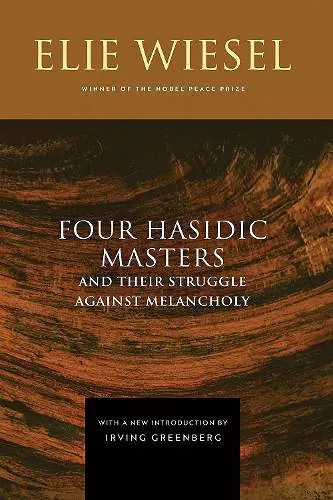Four Hasidic Masters and Their Struggle against Melancholy
Elie Wiesel author Irving Greenberg editor
Format:Hardback
Publisher:University of Notre Dame Press
Published:15th Oct '23
£27.99
Supplier delay - available to order, but may take longer than usual.

Elie Wiesel, winner of the Nobel Peace Prize, studies four different rebbes in eighteenth-century Eastern Europe, delving into their lives, their work, and their impact on the Hasidic movement and beyond.
In Four Hasidic Masters and Their Struggle against Melancholy, Jewish author, philosopher, and humanist Elie Wiesel presents the stories of four Hasidic masters, framing their biographies in the context of his own life, with direct attention to their premonitions of the tragedy of the Holocaust. These four leaders—Rebbe Pinhas of Koretz, Rebbe Barukh of Medzebozh, the Holy Seer of Lublin, and Rebbe Naphtali of Ropshitz—are each charismatic and important figures in Eastern European Hasidism. Through careful study and consideration, Wiesel shows how each of these men were human, fallible, and susceptible to anger, melancholy, and despair. We are invited to truly understand their work both as religious figures studying and pursuing the divine and as humans trying their best to survive in a world rampant with pain and suffering.
This new edition of Four Hasidic Masters, originally published in 1978, includes a new text design, cover, the original foreword by Theodore M. Hesburgh, C.S.C., and a new introduction by Rabbi Irving Greenberg, introducing Wiesel’s work to a new generation of readers.
“As always, Wiesel’s characters are infused with the breath of life: these extraordinary men are fully human, whether reeling in spiritual ecstasy or pondering their existential melancholy, the loneliness that accompanies vision and greatness. . . . These tales make inspiring and fascinating reading for all.” —Library Journal (review of previous edition)
“Wiesel’s theme is that four great masters, Pinhas of Koretz, Barukh of Medzebozh, the Seer of Lublin, and Naphtali of Ropshitz, were each a source of inspiration for others, communicating joy and fervour, but were themselves locked in struggles with melancholy and often fear. Through their legends and writings, Wiesel sees them fighting off their sorrow with exuberance, inundating their despair with an urgent commitment. Sometimes they fail. It is a delicate and worthwhile collection.” —A. Podet, European Judaism (review of previous edition)**
“Drawing extensively on Jewish legend and tradition, Wiesel creates literature of lasting power and moral authority. . . . As Wiesel portrays each of these teachers, his book becomes a classic Hasidic tale about friendship and hope against overwhelming odds.” —John K. Roth, Thought: A Review of Culture and Idea (review of previous edition)
“The delightful work, in the by now well-known manner of Elie Wiesel, continues his recounting of Hasidic tales begun in Souls on Fire. . . . On their own terms they are splendid.” —Choice (review of a previous edition)
“For Wiesel, Hasidism is not a theology or a philosophy. It is not an abstract system of ideas or a conception of the Deity. It is a friendship and a concern for people and for God. Hasidism is the opposite of solitude. It is a sense of being bound up together with all other human beings in their joy and in their distress and of being bound up with God in his joy and in his distress.” ―Commonweal (review of a previous edition)
"Another beautifully written and prepared work by one of the fine writers of our time." ―The Jewish Post and Opinion (review of a previous edition)
“There is more help for the troubled in these stories than in many books programmed for self-help." ―Christian Century (review of a previous edition)
“Elie Wiesel is one of the great writers of this generation.” ―New York Times Book Review (review of a previous edition)
“Wiesel brings a journalist’s optimism to his studies of the Hasidic saints who set Eastern European Jewry alight in the 18th century with the faith that brought it through the last, worst centuries of persecution.” ―The Boston Globe (review of a previous edition)
ISBN: 9780268207274
Dimensions: 216mm x 140mm x 11mm
Weight: unknown
172 pages
Expanded Edition